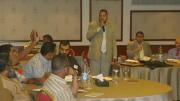

Subscríbete al SCP News
Enhancing of the environmental management and performance of Egyptian SMEs in coastal areas

About 50 participants attended the workshop with the majority representing stakeholders from coastal governorates and some from Cairo with an objective to highlight the sustainability concerns in the management of Small and Medium Enterprises (SMEs) in Egypt. SMEs are considered the potential engine of growth in the economy, employing more than 40% of total employment in the country and with a contribution of over 80% of GDP through functioning across a broad range of economic activities.
The workshop aimed at building the capacity of the participants on how to properly manage the environmental impacts of industries and on tools and measures for mitigating the impacts on the Mediterranean Sea. The presentations covered the European experience e.g. Integrated Pollution and Prevention Control (IPPC) and using the Best Available Techniques (BAT) approach. In addition the participants learned about processes and approaches implemented by some projects and agencies at the national level e.g. the Egyptian Pollution Abatement Project, EPAP II, and the role and best practices from the National Cleaner Production Center.
Among the multitude of themes discussed in the workshop was the portfolio of funding and technical assistance mechanisms available from national authorities in coordination with funding partners for SMEs which embark on complying with the Egyptian Environmental Law. The workshop also provided a better understanding of the concepts of green economy and energy efficiency as adequate approaches for mitigating the impacts of polluting industries.
In addition to the presentations, case studies and practical examples, the workshop concluded with a site visit to the Singer Bricks Factories in South Helwan, where the participants witnessed a good model of minimizing pollution, enhancing energy efficiency, providing a better work environment for the laborers while at the same time producing better products and achieving higher financial revenues.















